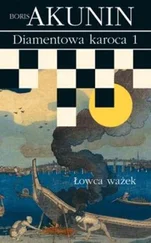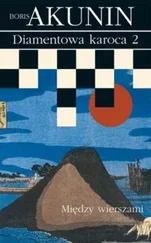After Fandorin dropped the envelope with the five-cent ‘lightning’ stamp on it into the slit above the crossed post horns, less than half an hour went by before a fine young fellow in a dandified blue uniform rode up on a pony, checked the contents of the box and went clopping off over the cobblestones up the slope – to deliver the correspondence to the addressee at Number 130, the Bluff.
‘What is in the envelope?’ Tamba asked for the fourth time.
The first three attempts had produced no response. Fandorin’s feverish agitation as he addressed the envelope had given way to apathy. The gaijin didn’t hear any questions that he was asked – he sat there, gazing blankly at the street, every now and then beginning to gulp in air through his mouth and rub his chest, as if his waistcoat was too tight for him.
But old Tamba was patient. He waited and waited – and then asked again. And then again.
Eventually he got an answer.
‘Eh?’ Erast Petrovich asked with a start. ‘In the envelope? A poem. The moment Shirota reads it, he’ll lose control and come running. And he’ll pass along this street, over the b-bridge. Alone.’
Tamba didn’t understand about the poem, but he didn’t ask any questions – it wasn’t important.
‘Alone? Very good. We’ll grab him, it won’t be hard.’
He leaned across to Dan and started speaking rapidly in Japanese. The nephew kept nodding and repeating:
‘ Hai, hai, hai …’
‘There’s no need to grab him,’ said Fandorin, interrupting their planning. ‘It will be enough if you simply bring him here. Can you do that?’
Shirota appeared very soon – Tamba had barely finished his preparations.
There was the sound of rapid hoof beats and a horseman in a panama hat and a light, sandy-coloured suit came riding round the bend. The former secretary was unrecognisable, so elegant, indeed dashing, did he look. He had the black brush of a moustache sprouting under his flattish nose, and instead of the little steel-rimmed spectacles, his face was adorned with a brand new gold pince-nez.
The native gentleman’s flushed features and the furious gait of his mount suggested that Shirota was in a terrible hurry, but he was obliged to pull back on the reins just before the bridge, when a hunchbacked beggar in a dusty kimono threw himself across the horseman’s path.
He grabbed hold of the bridle and started begging in a repulsive, plaintively false descant whine.
Restraining his overheated horse, Shirota abused the mendicant furiously and jerked on the reins, but the tramp had clutched them in a grip of iron.
Erast Petrovich observed this little incident from the window of the tea parlour, trying to stay in the shadow. Two or three passers-by, attracted for a brief moment by the shouting, had already turned away from such an uninteresting scene and gone about their business.
For half a minute the horseman tried in vain to free himself. Then, at last, he realised there was a quicker way. Muttering curses, he rummaged in his pocket, fished out a coin and tossed it to the old man.
And it worked – the beggar immediately let go of the reins. In a sudden impulse of gratitude, he seized his benefactor’s hand and pressed his lips against it (he must have seen gaijins doing that somewhere). Then he jumped back, gave a low bow and scurried away.
Amazingly enough, though, Shirota seemed to have forgotten that he was in a hurry; he shook his head, then rubbed his temple, as if he were trying to remember something. Then suddenly he swayed drunkenly and slumped sideways.
He would quite certainly have fallen, and probably bruised himself cruelly on the cobblestones, if a young native man of a most respectable appearance had not been walking by. The youth managed to catch the fainting horseman in his arms and the proprietor of the tea parlour came running out to help, together with the pastor, who had abandoned his numerous family.
‘Drunk?’ shouted the proprietor.
‘Dead?’ shouted the pastor.
The young man felt Shirota’s pulse and said:
‘Fainted. I’m a doctor … That is, I soon will be a doctor.’ He turned to the proprietor. ‘If you would allow us to carry this man into your establishment, I could help him.’
The three of them lugged the insensible body into the tea parlour and, since there was nowhere to put the sick man down in the English half, they carried him through into the Japanese half with its tatami – to the very spot where Erast Petrovich was finishing his tea.
It took a few minutes to get rid of the proprietor, and especially the pastor, who was very keen to comfort the martyr in his final minutes. The medical student explained that it was an ordinary fainting fit, there was no danger and the patient merely needed to lie down for a little while.
Soon Tamba came back. It was impossible to recognise this respectable-looking, clean old man as the repulsive beggar from the bridge. The jonin waited for the outsiders to go, then he leaned over Shirota, squeezed his temples with his fingers and sat down to one side.
The renegade came round immediately.
He batted his eyelids, studying the ceiling quizzically. He raised his head – and met the titular counsellor’s cold, blue-eyed gaze. He jerked upright and noticed the two Japanese near by. He barely glanced at young Dan, but stared at the quiet little old man as if he had never seen a more terrifying sight.
Shirota turned terribly pale and drops of sweat stood out on his forehead.
‘Is that Tamba?’ he asked Fandorin. ‘Yes, I recognised him from the description … This is what I was afraid of! That they had kidnapped Sophie. How can you, a civilised man, be in league with those ghouls?’
But when he glanced once again at his former colleague’s stony face, his features drooped and he murmured:
‘Yes, yes, of course … You had no choice … I understand. But I know you are a noble man. You will not allow the shinobi to do her any harm! Erast Petrovich, Mr Fandorin, you also love, you will understand me!’
‘No, I will not,’ the vice-consul replied indifferently. ‘The woman I loved is dead. Thanks to your efforts. Tamba said that you drew up the plan of the operation. Well then, the Don is fortunate in his choice of d-deputy.’
Shirota looked at Erast Petrovich in terror, frightened less by the meaning of the words than the lifeless tone in which they were spoken.
He whispered fervently:
‘I … I’ll do whatever they want, only let her go! She doesn’t know anything, she doesn’t understand anything about my business. She must not be held as a hostage! She is an angel!’
‘It never even entered my head to t-take Sophia Diogenovna hostage,’ Fandorin replied in the same dull, strangled voice. ‘What scurrilous nonsense you talk.’
‘That’s not true! I have received a note from her. This is Sophie’s hand!’ Shirota extracted the small sheet of pink paper from the torn envelope and read out: ‘“My poor heart can bear this no more. Oh come quickly to help me now! And if you do not come, you know I shall lose my life for you”. Tamba guessed where I had hidden Sophie and kidnapped her!’
The fiancé of the ‘captain’s daughter’ was a pitiful sight: lips trembling, pince-nez dangling on its lace, fingers intertwined imploringly.
But Erast Petrovich was not moved by this selfless love. The vice-consul rubbed his chest (those cursed lungs!) and simply said:
‘It’s not a note. It’s a poem.’
‘A poem?’ Shirota exclaimed in amazement. ‘Oh, come now! I know what Russian poems are like. There’s no rhyme here: “more” and “know” is not a rhyme. You can have no rhymes in blank verse, but that has rhythm. For instance, Pushkin: “I visited once more that corner of the earth where I spent two forgotten years in exile”. But this has no rhythm.’
Читать дальше









